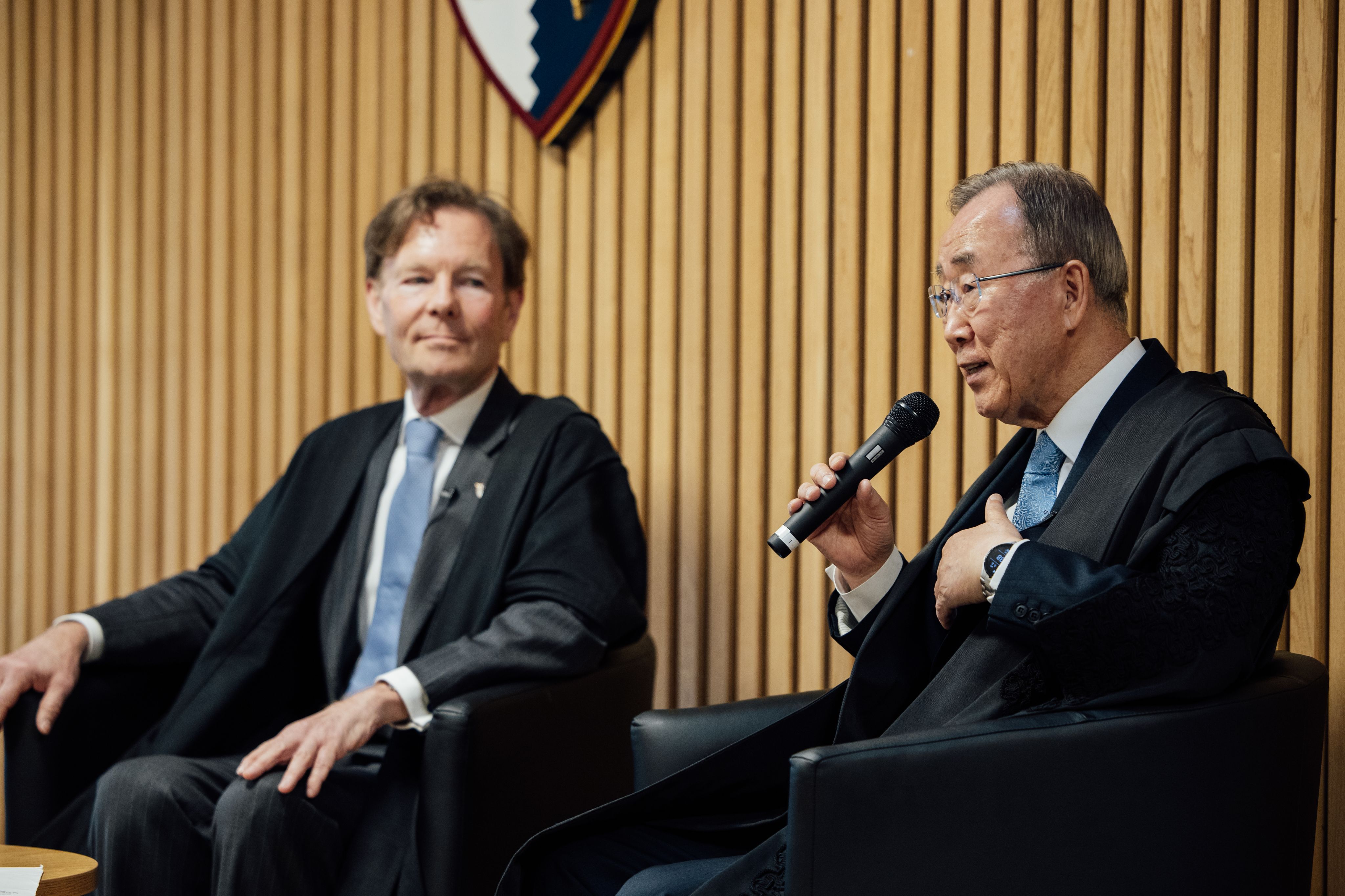Questions and Answers following Ban Ki-moon’s lecture

Q1: Sir, my name is Graham Jones. I am very proud to be a member of this College, and in its diversity – it is a mini-United Nations! I was inspired by your lecture. Some may not be aware that the work of the United Nations is promoted through networks of local branches of the United Nations Association. Oxford has had a branch of the UN since the 1970s, and I have the privilege to be on its current committee. So, what advice would you give to the members of the local UNA committee on how best they can support the work of the United Nations, which has never been more needed?
Ban Ki-moon: Thank you very much. There are many United Nations Associations around the world. I believe that the United Nations Association in the United Kingdom has been very active. They are people taking a leadership role, whether political or business leaders, academic leaders, or civil society leaders. This is a very good system. They can be a great support for the United Nations. The United Nations can't do things alone. We need this support – it’s a partnership. So, I am fully encouraging of the UNAs efforts to work for the betterment of our society, and upholding all United Nations charter provisions. So please keep up the good work. I as Secretary-General attended meetings hosted by UNA United Kingdom. Thank you very much.
Q2: That was inspiring; thank you for everything you've done to be a great champion for women and for the climate. I would be interested in your thoughts and reflections – and also maybe the inside thinking currently in the UN – around artificial intelligence and how that challenges the very concepts of human rights, particularly as regards robots and computer systems that will be increasingly super intelligent and may be making decisions for us.
Ban Ki-moon: I have been urging that there should be a good governance system. Unfortunately, at this time, there are no such internationally approved and agreed-upon rules. There are arguments for having international law regulating this spread of AI in a responsible way. An irresponsible way is a dangerous way. It's not the same thing, but the Nuclear Non-Proliferation Treaty has regulated the spread of nuclear weapons. Of course, there are some countries outside of this Treaty, such as North Korea, Israel and Pakistan. But we have been able to regulate irresponsible nuclear testing. Likewise, we should have that kind of international covenants around artificial intelligence.
Q3: The United Nations often seems bogged down. What is the best way for the United Nations to be able to take action?
Ban Ki-moon: During my ten-year service as Secretary-General, this has been a tough but important issue: how to reform the United Nations so that the United Nations will be able to address all the issues which are now happening in this world. But unfortunately, there has not been much progress in reforming the United Nations. When you talk about reform of the United Nations, nobody talks about how we can really strengthen and regulate the Security Council, and the way of decision-making. We need to revise the charter of the United Nations. But amending this charter of the United Nations has become almost impossible. There have been ad hoc committees to try to amend and improve the way the United Nations makes decisions. I'm disappointed that the international community has not been able to agree on anything.
The charter has been amended just once since the creation of the United Nations, when they expanded the number of Security Council Member States to fifteen. Since then, because of the undesirable relationship among big powers, particularly veto-wielding powers, nothing has been done. There is clearly a problem with the United Nations making decisions. The Security Council cannot make any decision because of the irresponsible use of the veto power by the veto powers, particularly Russia, the United States, and China. The greatest number of vetoes have been cast by Russia. Then unexpectedly the second most veto-wielding country is the United States, then China. They should realise that they cannot go on this way. This is very irresponsible on the part of the chief five countries. The United Kingdom is also included, but the UK has not cast a veto power many times. So, the UK and France have been reasonable, while three others were always casting veto powers. I made this one for my proposals to the United Nations, at the General Assembly in my capacity as Secretary-General, that this should be changed. But no one listened. This is what happened, I'm sorry to tell you.
Jonathan Michie: I'm very sorry too, but I'm afraid we're out of time. However, there are drinks outside, so those of you who haven't had a chance to ask your questions yet, you can ask them in a moment to Ban Ki-moon outside. Before that, I should say on the question of global regulation of artificial intelligence, the UK government did convene a summit at Bletchley Park, where Rishi Sunak interviewed Elon Musk - but apart from that, it went well! The plan is to have a series of these summits, and the next one is going to be in South Korea – so, we have high hopes for that one, at least.
Now, please join me in thanking Ban Ki-moon for his thoughtful, informative, and inspirational speech – thank you!
